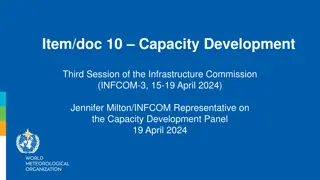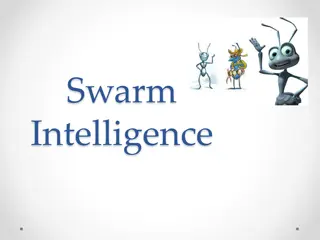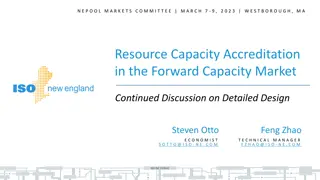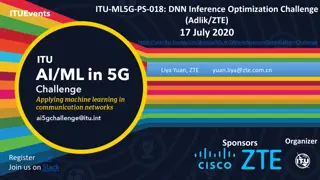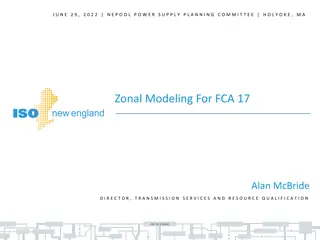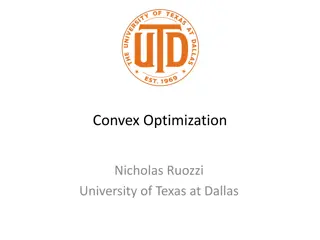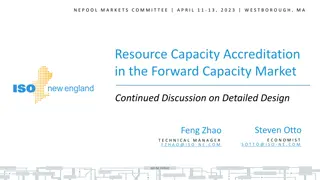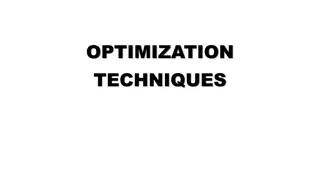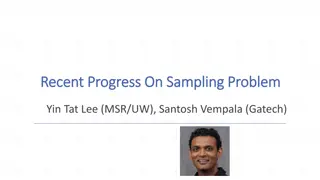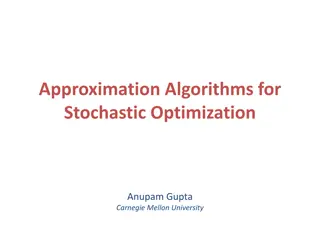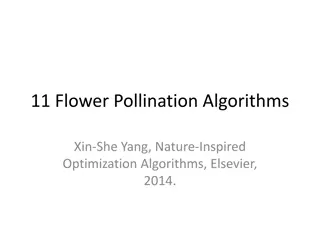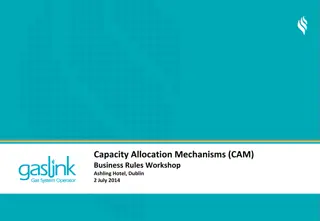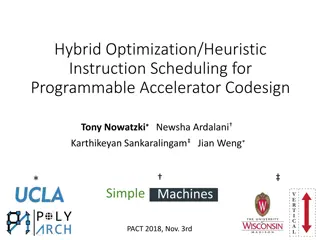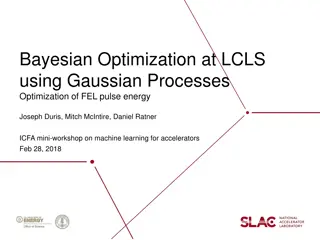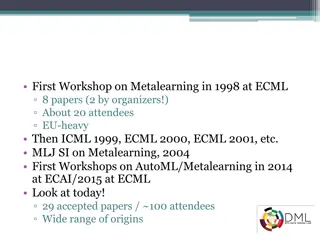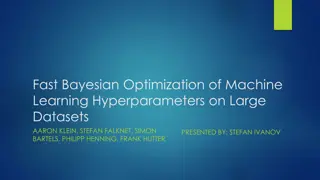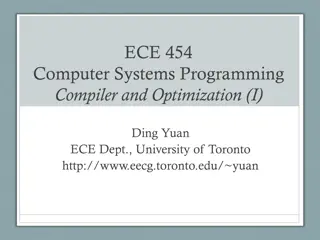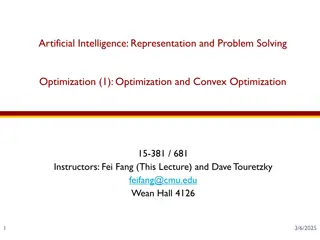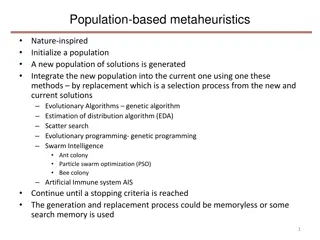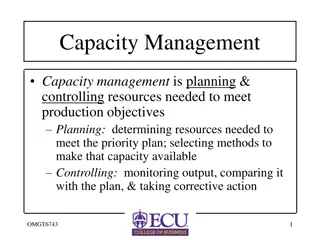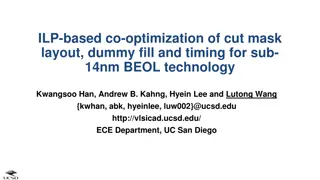Enhancing Query Optimization in Production: A Microsoft Journey
Explore Microsoft's innovative approach to query optimization in production environments, addressing challenges with general-purpose optimization and introducing specialized cloud-based optimizers. Learn about the implementation details, experiments conducted, and the solution proposed. Discover how
2 views • 27 slides
Introduction to Optimization in Process Engineering
Optimization in process engineering involves obtaining the best possible solution for a given process by minimizing or maximizing a specific performance criterion while considering various constraints. This process is crucial for achieving improved yields, reducing pollutants, energy consumption, an
10 views • 52 slides
INFCOM Capacity Development Initiatives Overview
INFCOM's capacity development initiatives focus on enhancing Earth system observations, closing capacity gaps on weather services, and supporting new opportunities in competencies and capabilities. Collaboration and coordination mechanisms have been established to facilitate sharing of information a
0 views • 11 slides
Swarm Intelligence: Concepts and Applications
Swarm Intelligence (SI) is an artificial intelligence technique inspired by collective behavior in nature, where decentralized agents interact to achieve goals. Swarms are loosely structured groups of interacting agents that exhibit collective behavior. Examples include ant colonies, flocking birds,
4 views • 88 slides
Resource Capacity Accreditation in Forward Capacity Market Overview
Resource Capacity Accreditation project aims to enhance ISO-NE's accreditation processes in the Forward Capacity Market, supporting a reliable, clean-energy transition. Key concepts covered in this educational presentation include accreditation space, methods, benefits, challenges, and improvement o
2 views • 53 slides
Resource Capacity Accreditation in the Forward Capacity Market Discussion
The presentation discusses improvements in the Resource Capacity Accreditation project of ISO-NE's Forward Capacity Market to support a reliable, clean-energy transition. It includes details on seasonal components, reconfiguration auctions, trading obligations, and stakeholder schedules. Examples pr
3 views • 71 slides
DNN Inference Optimization Challenge Overview
The DNN Inference Optimization Challenge, organized by Liya Yuan from ZTE, focuses on optimizing deep neural network (DNN) models for efficient inference on-device, at the edge, and in the cloud. The challenge addresses the need for high accuracy while minimizing data center consumption and inferenc
1 views • 13 slides
Capacity Zone Modeling for Forward Capacity Auction 17 Results
This presentation unveils the Capacity Zone modeling calculations for Forward Capacity Auction 17 associated with the 2026-2027 Capacity Commitment Period by ISO-NE PUBLIC. It delves into boundary definitions, import-constrained zone modeling, and market rules guiding the assessments and modeling pr
2 views • 16 slides
Proposal for Resource Capacity Accreditation in Forward Capacity Market
The ISO-NE has proposed improvements to the accreditation processes in the Forward Capacity Market (FCM) through the Resource Capacity Accreditation (RCA) project. The aim is to enhance the accreditation of resource contributions to ensure reliability during the transition to a cleaner energy mix. T
0 views • 59 slides
Discrete Optimization in Mathematical Modeling
Discrete Optimization is a field of applied mathematics that uses techniques from combinatorics, graph theory, linear programming, and algorithms to solve optimization problems over discrete structures. This involves creating mathematical models, defining objective functions, decision variables, and
2 views • 12 slides
Generalization of Empirical Risk Minimization in Stochastic Convex Optimization by Vitaly Feldman
This study delves into the generalization of Empirical Risk Minimization (ERM) in stochastic convex optimization, focusing on minimizing true objective functions while considering generalization errors. It explores the application of ERM in machine learning and statistics, particularly in supervised
2 views • 11 slides
Optimization Techniques in Convex and General Problems
Explore the world of optimization through convex and general problems, understanding the concepts, constraints, and the difference between convex and non-convex optimization. Discover the significance of local and global optima in solving complex optimization challenges.
1 views • 24 slides
Resource Capacity Accreditation in the Forward Capacity Market: Continued Discussion and Detailed Design
The Resource Capacity Accreditation (RCA) project by ISO-NE aims to enhance accreditation processes in the Forward Capacity Market (FCM) to support a reliable, clean-energy transition. This presentation focuses on seasonal components of Capacity Supply Obligations (CSO), Pay-for-Performance (PFP) ob
0 views • 58 slides
Optimization Techniques for Design Problems
Explore the basic components of optimization problems, such as objective functions, constraints, and global vs. local optima. Learn about single vs. multiple objective functions and constrained vs. unconstrained optimization problems. Dive into the statement of optimization problems and the concept
0 views • 96 slides
Insights into Recent Progress on Sampling Problems in Convex Optimization
Recent research highlights advancements in solving sampling problems in convex optimization, exemplified by works by Yin Tat Lee and Santosh Vempala. The complexity of convex problems, such as the Minimum Cost Flow Problem and Submodular Minimization, are being unraveled through innovative formulas
4 views • 47 slides
Workshop on New Approaches to Statistical Capacity Development in Lao PDR
This workshop, hosted by PARIS21 and UNDP, focuses on enhancing statistical capacity development in Lao PDR. It covers topics like successful capacity development programs, partnerships for national statistics development, and prioritizing needs versus international requirements. The Lao Statistics
0 views • 15 slides
Changes in Capacity Allocation Regulations for Gas Infrastructures in Portugal
The new regulation in Portugal brings significant changes in capacity booking and trading to promote convergence with CAM NC and enable a secondary market. Major changes include ex-ante payment of capacity rights, capacity allocation via a booking platform, and enhancement of liquidity in the second
0 views • 13 slides
Approximation Algorithms for Stochastic Optimization: An Overview
This piece discusses approximation algorithms for stochastic optimization problems, focusing on modeling uncertainty in inputs, adapting to stochastic predictions, and exploring different optimization themes. It covers topics such as weakening the adversary in online stochastic optimization, two-sta
0 views • 33 slides
The Assisted Decision-Making (Capacity) Act 2015 in the Criminal Justice Context
The Assisted Decision-Making (Capacity) Act 2015 introduces key reforms such as the abolition of wards of court system for adults, a statutory functional test of capacity, new guiding principles, a three-tier framework for support, and tools for advance planning. It emphasizes functional assessment
2 views • 17 slides
Somerset Mental Capacity Training Session June 2023
This information outlines a mental capacity drop-in session for care providers in June 2023, hosted by Chris Hamilton from Somerset Council. It covers topics like the aim of the Mental Capacity Act, the Somerset mental capacity competency framework, and the importance of staff training. It emphasize
0 views • 21 slides
Flower Pollination Algorithm: Nature-Inspired Optimization
Real-world design problems often require multi-objective optimization, and the Flower Pollination Algorithm (FPA) developed by Xin-She Yang in 2012 mimics the pollination process of flowering plants to efficiently solve such optimization tasks. FPA has shown promising results in extending to multi-o
2 views • 15 slides
Capacity Allocation Mechanisms (CAM) Business Rules Workshop Summary
This summary provides insights into the Capacity Allocation Mechanisms (CAM) Business Rules Workshop held at Ashling Hotel, Dublin on July 2, 2014. The workshop covered topics such as CAM business rules scope, key features, auction processes, code modifications, implementation timelines, and consult
1 views • 32 slides
Hybrid Optimization Heuristic Instruction Scheduling for Accelerator Codesign
This research presents a hybrid optimization heuristic approach for efficient instruction scheduling in programmable accelerator codesign. It discusses Google's TPU architecture, problem-solving strategies, and computation graph mapping, routing, and timing optimizations. The technique overview high
4 views • 33 slides
Machine Learning Applications for EBIS Beam Intensity and RHIC Luminosity Maximization
This presentation discusses the application of machine learning for optimizing EBIS beam intensity and RHIC luminosity. It covers topics such as motivation, EBIS beam intensity optimization, luminosity optimization, and outlines the plan and summary of the project. Collaborators from MSU, LBNL, and
3 views • 23 slides
Bayesian Optimization at LCLS Using Gaussian Processes
Bayesian optimization is being used at LCLS to tune the Free Electron Laser (FEL) pulse energy efficiently. The current approach involves a tradeoff between human optimization and numerical optimization methods, with Gaussian processes providing a probabilistic model for tuning strategies. Prior mea
1 views • 16 slides
Metalearning and Hyper-Parameter Optimization in Machine Learning Research
The evolution of metalearning in the machine learning community is traced from the initial workshop in 1998 to recent developments in hyper-parameter optimization. Challenges in classifier selection and the validity of hyper-parameter optimization claims are discussed, urging the exploration of spec
2 views • 32 slides
AI/ML Integration in IEEE 802.11 WLAN: Enhancements & Optimization
Discussing the connection between Artificial Intelligence (AI)/Machine Learning (ML) and Wireless LAN networks, this document explores how AI/ML can improve IEEE 802.11 features, enhance Wi-Fi performance through optimized data sharing, and enable network slicing for diverse application requirements
0 views • 11 slides
Fast Bayesian Optimization for Machine Learning Hyperparameters on Large Datasets
Fast Bayesian Optimization optimizes hyperparameters for machine learning on large datasets efficiently. It involves black-box optimization using Gaussian Processes and acquisition functions. Regular Bayesian Optimization faces challenges with large datasets, but FABOLAS introduces an innovative app
0 views • 12 slides
Price Optimization in Auto Insurance Markets
This presentation delves into the concept of price optimization in the auto insurance industry, covering actuarial, economic, and regulatory aspects. It addresses the controversy surrounding price optimization, various state definitions, concerns, and the use of sophisticated tools to quantify busin
5 views • 29 slides
Quantum Adiabatic Optimization vs. Quantum Monte Carlo
This content delves into the comparison between Quantum Adiabatic Optimization and Quantum Monte Carlo methods in quantum computing, discussing their approaches, algorithms, potential applications, and theoretical possibilities. It explores the concepts of adiabatic theorem, simulated annealing, sto
0 views • 19 slides
ECE 454 Computer Systems Programming & Optimization
Explore the world of computer systems programming and optimization with ECE 454 at the University of Toronto. Dive into compiler basics, manual optimization, advanced techniques, and more through a comprehensive overview of compiler history. From programmer-machine instructions to high-level languag
0 views • 27 slides
Machine learning optimization
Dive into the world of machine learning optimization with a focus on gradient descent, mathematical programming, and constrained optimization. Explore how to minimize functions using gradient descent and Lagrange multipliers, as well as the motivation behind direct optimization methods. Discover the
0 views • 16 slides
Artificial Intelligence: Representation and Problem Solving Optimization
This lecture explores optimization and convex optimization in the field of Artificial Intelligence, covering topics such as defining optimization problems, discrete and continuous variables, feasibility, and different types of optimization objectives. The content delves into the challenges and solut
0 views • 36 slides
Nature-Inspired Population-Based Metaheuristics and Optimization Techniques
This comprehensive guide delves into various population-based metaheuristics and nature-inspired optimization techniques such as evolutionary algorithms, swarm intelligence, and artificial immune systems. It covers concepts like genetic algorithms, ant colony optimization, particle swarm optimizatio
0 views • 6 slides
Non-Linear Optimization in Decision Making
Enhance logical and analytical problem-solving skills in non-linear optimization for decision making. Explore optimization terminology, classification of optimization problems, and various techniques for tackling complex decision-making scenarios.
0 views • 15 slides
Understanding Discrete Optimization in Graph Theory
Explore the relationship between counting techniques, graph theory, and discrete optimization, with examples illustrating the transition from counting problems to optimization problems. Learn about applying optimization in scheduling and making graph models, as well as the role of graphs in discrete
1 views • 8 slides
Effective Capacity Management Strategies for Production Objectives
Learn about capacity management, matching capacity with demand, capacity planning process, resource planning, rough-cut capacity planning, and capacity requirements planning in operations management. Understand the importance of planning and controlling resources to ensure efficient production proce
0 views • 17 slides
Cut Mask Co-Optimization for Advanced BEOL Technology
Explore the ILP-based co-optimization of cut mask layout, dummy fill, and timing for sub-14nm BEOL technology. The proposed approach addresses self-aligned multiple patterning, cut process extension, and the impact of cut mask optimization on wire performance. Learn about related works, motivation,
0 views • 23 slides
Understanding Gradient Descent Optimization
Explore the concept of Gradient Descent optimization method, its application in solving optimization problems, tuning learning rates, adaptive learning rates, and Adagrad algorithm. Learn how to start, compute gradients, and make movements for efficient optimization.
0 views • 38 slides
Optimization Fundamentals and Applications
Explore the essentials of optimization with this PowerPoint presentation by Peggy Batchelor from Furman University. Learn how to recognize decision-making scenarios suitable for optimization modeling, formulate algebraic and spreadsheet models for linear programming problems, and use Excel's Solver
0 views • 33 slides


